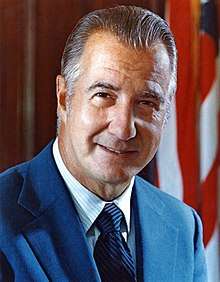1968 Republican National Convention
|
1968 presidential election | |
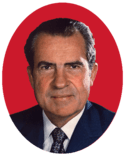  Nominees Nixon and Agnew | |
| Convention | |
|---|---|
| Date(s) | August 5–8, 1968 |
| City | Miami Beach, Florida |
| Venue | Miami Beach Convention Center |
| Keynote speaker | Daniel J. Evans |
| Candidates | |
| Presidential nominee | Richard M. Nixon of New York |
| Vice Presidential nominee | Spiro T. Agnew of Maryland |
| Voting | |
| Total delegates | 1,333 |
| Votes needed for nomination | 667 (majority) |
| Results (President) |
Nixon (NY/CA): 1,238 (92.87%) Rockefeller (NY): 93 (6.98%) Reagan: (CA): 2 (0.15%) |
| Results (Vice President) |
Agnew (MD): 1,119 (83.95%) Romney (MI): 186 (13.95%) Lindsay (NY): 10 (0.75%) Others: 2 (0.15%) Not Voting: 16 (1.20%) |
The 1968 National Convention of the Republican Party of the United States was held at the Miami Beach Convention Center in Miami Beach, Dade County, Florida, from August 5 to August 8, 1968 to select the party's nominee in the general election. It nominated former Vice President Richard M. Nixon for President and Maryland Governor Spiro T. Agnew for Vice President. It was the fourth time Nixon had been nominated on the Republican ticket as either its vice-presidential (1952 and 1956) or presidential candidate (1960).
Political context
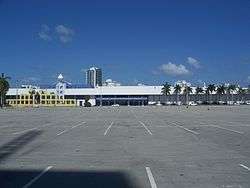
Richard M. Nixon, former Vice President of the United States under 34th President Dwight D. Eisenhower, emerged as the frontrunner again for the 1968 Republican presidential nomination. Nixon had been the Republican Party nominee in the 1960 presidential election, and lost to Democratic Party candidate John F. Kennedy.
The so-called "New Nixon" in the 1968 presidential election devised a "Southern strategy," taking advantage of the region's opposition to racial integration and other progressive/liberal policies of the national Democratic Party and the administration of incumbent 36th President Lyndon B. Johnson.
Nixon decided not to re-select his 1960 running mate Henry Cabot Lodge Jr., and House Minority Leader Gerald R. Ford of Michigan proposed New York City Mayor John V. Lindsay for Vice President. Nixon turned instead to another perceived moderate, Maryland Governor Spiro T. Agnew. Agnew, former Baltimore County Executive in the Baltimore City suburbs (1963–1967), and since Governor of Maryland, had come to Republican leaders and Nixon's attention when he summoned several Black civic, religious, and political leaders in Baltimore to the local State Office Building complex, following the disastrous April 1968 urban riots which enveloped Black sections of East and West Baltimore in the wake of the assassination of Martin Luther King Jr. in Memphis, Tennessee. Agnew complained of the Black leaders' lack of support after a number of what he perceived to be positive projects, programs and support by his Republican administration for the minority communities in the city. Agnew's biting comments caused many in the audience to walk out.
Nixon was nominated on the first ballot with 692 votes to 277 votes for Nelson Rockefeller, 182 votes for California Governor Ronald Reagan and the rest scattered. In his acceptance speech he deplored the state of the union:
When the strongest nation in the world can be tied down for four years in Vietnam with no end in sight, when the richest nation in the world can't manage its own economy, when the nation with the greatest tradition of the rule of law is plagued by unprecedented racial violence, when the President of the United States cannot travel abroad or to any major city at home, then it's time for new leadership for the United States of America.[1]
Nixon also said that he had "a good teacher", referring to Eisenhower, and made the delegates happy with the statement "Let's win this one for Ike!" Eisenhower was not present during Nixon's speech nor during any part of the convention. Due to failing health, he was under doctor's orders not to travel. He died the following March.
Balloting
The following were placed into nomination:
Nominated for President
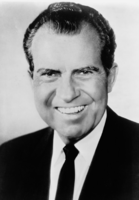
Former Vice President
Richard Nixon
from California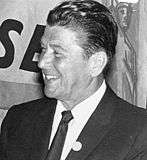
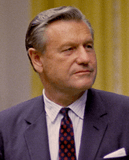
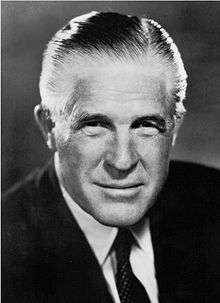
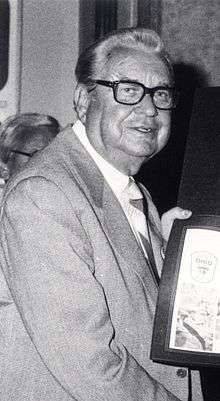

Senator
Clifford Case
of New Jersey.jpg)
Senator
Frank Carlson
of Kansas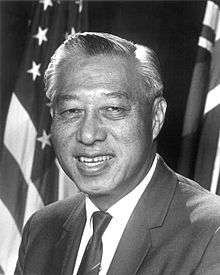
Senator
Hiram Fong
of Hawaii
Nominated for Vice President
The Republican Convention Tally results
| President | (before switches) | (after switches) | Vice President | Vice-Presidential votes |
|---|---|---|---|---|
| Richard M. Nixon | 692 | 1238 | Spiro T. Agnew | 1119 |
| Nelson Rockefeller | 277 | 93 | George Romney | 186 |
| Ronald Reagan | 182 | 2 | John V. Lindsay | 10 |
| Ohio Governor James A. Rhodes | 55 | — | Massachusetts Senator Edward Brooke | 1 |
| Michigan Governor George Romney | 50 | — | James A. Rhodes | 1 |
| New Jersey Senator Clifford Case | 22 | — | Not Voting | 16 |
| Kansas Senator Frank Carlson | 20 | — | — | |
| Arkansas Governor Winthrop Rockefeller | 18 | — | — | |
| Hawaii Senator Hiram Fong | 14 | — | — | |
| Harold Stassen | 2 | — | — | |
| New York City Mayor John V. Lindsay | 1 | — | — |
Results by state

The balloting by state was as follows:[3][4][5]
| State | |||||||||||
|---|---|---|---|---|---|---|---|---|---|---|---|
| Alabama | 14 | 12 | |||||||||
| Alaska | 11 | 1 | |||||||||
| Arizona | 16 | ||||||||||
| Arkansas | 18 | ||||||||||
| California | 86 | ||||||||||
| Colorado | 14 | 3 | 1 | ||||||||
| Connecticut | 4 | 12 | |||||||||
| Delaware | 9 | 3 | |||||||||
| Florida | 32 | 1 | 1 | ||||||||
| Georgia | 21 | 2 | 7 | ||||||||
| Hawaii | 14 | ||||||||||
| Idaho | 9 | 5 | |||||||||
| Illinois | 50 | 5 | 3 | ||||||||
| Indiana | 26 | ||||||||||
| Iowa | 13 | 8 | 3 | ||||||||
| Kansas | 20 | ||||||||||
| Kentucky | 22 | 2 | |||||||||
| Louisiana | 19 | 7 | |||||||||
| Maine | 7 | 7 | |||||||||
| Maryland | 18 | 8 | |||||||||
| Massachusetts | 34 | ||||||||||
| Michigan | 4 | 44 | |||||||||
| Minnesota | 9 | 15 | 1 | 1 | |||||||
| Mississippi | 20 | ||||||||||
| Missouri | 16 | 5 | 3 | ||||||||
| Montana | 11 | 3 | |||||||||
| Nebraska | 16 | ||||||||||
| Nevada | 9 | 3 | |||||||||
| New Hampshire | 8 | ||||||||||
| New Jersey | 18 | 22 | |||||||||
| New Mexico | 8 | 1 | 5 | ||||||||
| New York | 4 | 88 | |||||||||
| North Carolina | 9 | 1 | 16 | ||||||||
| North Dakota | 5 | 2 | 1 | ||||||||
| Ohio | 2 | 55 | 1 | ||||||||
| Oklahoma | 14 | 1 | 7 | ||||||||
| Oregon | 18 | ||||||||||
| Pennsylvania | 22 | 41 | 1 | ||||||||
| Rhode Island | 14 | ||||||||||
| South Carolina | 22 | ||||||||||
| South Dakota | 14 | ||||||||||
| Tennessee | 28 | ||||||||||
| Texas | 41 | 15 | |||||||||
| Utah | 2 | 6 | |||||||||
| Vermont | 9 | 3 | |||||||||
| Virginia | 22 | 2 | |||||||||
| Washington | 15 | 3 | 6 | ||||||||
| West Virginia | 11 | 3 | |||||||||
| Wisconsin | 30 | ||||||||||
| Wyoming | 12 | ||||||||||
| District of Columbia | 6 | 3 | |||||||||
| Puerto Rico | 5 | ||||||||||
| U.S. Virgin Islands | 2 | 1 | |||||||||
| Total | 692 | 277 | 182 | 55 | 50 | 22 | 20 | 18 | 14 | 2 | 1 |
See also
References
- ↑ "Address Accepting the Presidential Nomination at the Republican National Convention in Miami Beach, Florida". The American Presidency Project. Retrieved 16 August 2018.
- ↑ Troy, Schlesinger & Israel 2012, pp. 1318-1319.
- ↑ Lebanon Daily News. Lebanon, PA. August 8, 1968 https://www.newspapers.com/newspage/5415080/. Retrieved January 9, 2018. Missing or empty
|title=(help) - ↑ The News-Herald. Franklin, PA. August 8, 1968 https://www.newspapers.com/newspage/96895628/. Retrieved January 7, 2018. Missing or empty
|title=(help) - ↑ "1968 Republican Convention Roll Call". CBS Radio News. August 1968.
Bibliography
- Troy, Gil; Schlesinger, Arthur M.; Israel, Fred L. (2012). History of American Presidential Elections, 1789–2008. 3 (4 ed.). New York City: Facts on File. ISBN 978-0-8160-8220-9.
External links
- Republican Party platform of 1968 at The American Presidency Project
- Nixon nomination acceptance speech for President at RNC (transcript) at The American Presidency Project
- Video of Nixon nomination acceptance speech for President at RNC from C-SPAN (via YouTube)
- Audio of Nixon nomination acceptance speech for President at RNC
- Video of Agnew nomination acceptance speech for Vice President at RNC (via YouTube)
| Preceded by 1964 Daly City, California |
Republican National Conventions | Succeeded by 1972 Miami Beach, Florida |
